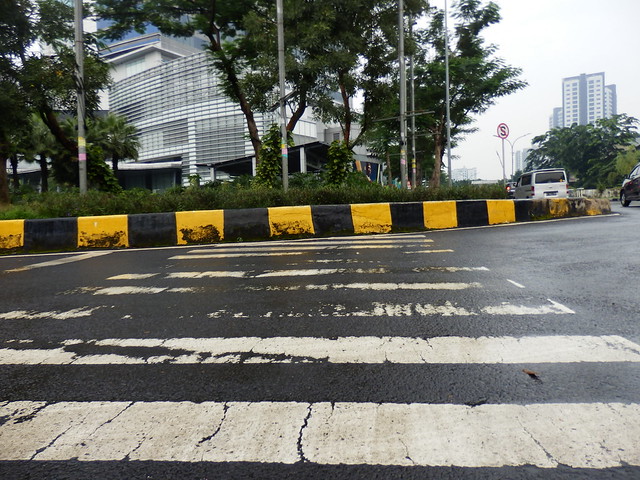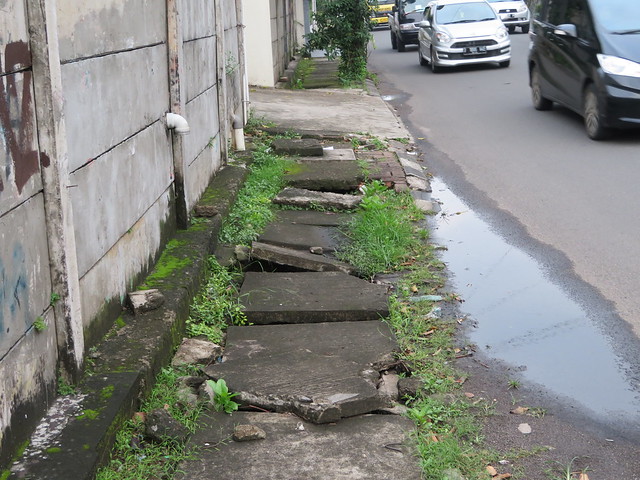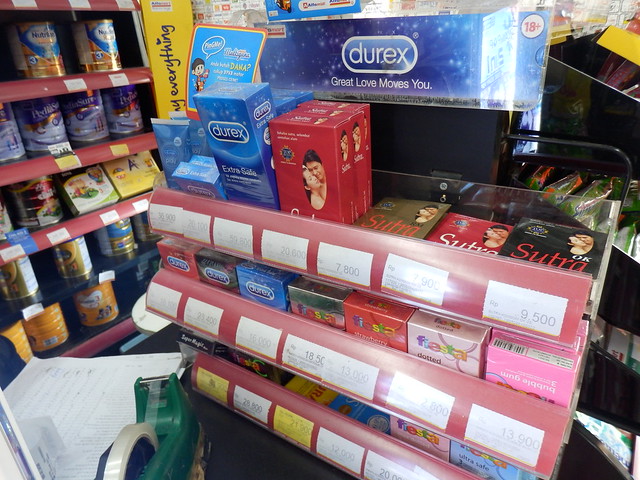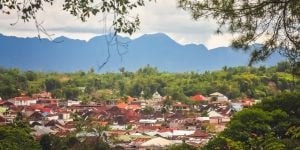Health issues
Alcohol - Advice that could save your life.
Alcohol is quite expensive in Indonesia but don't let that tempt you into buying cheap stuff from local shops.
The chains, Alfamart, Indomaret, and so on, are no longer suppliers, but it is legally available in some other shops.
Some areas now have a total ban on alcohol sales. Whilst this is often unpopular with expats, it's very popular with most locals (or they simply don't care) as they don't drink anyway.
Many small shops sell cheap gin, whisky or whatever but the stuff is laced with methanol, bleach and various other nasties that'll likely put you in hospital or a morgue.
Locals sometimes die of it as two lads in Wonosobo did when I lived there but it's also been known to kill tourists.
http://www.dailymail.co.uk/news/article … drink.html
The father of a young British backpacker who died after drinking poisonous gin has flown around the world in a bid to catch the people who sold her the lethal substance.
Brenton Emmons, 47, has travelled more than 8,000 miles to Indonesia after his daughter, Cheznye, tragically died there in April.
This stuff is common all over Indonesia so, to be safe, NEVER buy alcoholic drinks except in known shops.
indostocks wrote:RE: Alcohol consumption. Very good advice, Mas Fred!
Just my extra 2 sen...
Western spirit are extremely expensive in Indonesia so if you can find a local source for safe alcohol then treat them well. Manado and environs are sources for palm wine. Flores and the Batak region of Northern Sumatra are also places where locally sourced distillates can be encountered.
Again unless you are buying properly sealed western liquor or beer make sure of your source.
I live in Yogyakarta so I don't drink except for the occasional can or bottle of San Miguel.
Ubudian wrote:Booze in Bali:
Locally made arak is the high octane spirit of choice among the Balinese, and it is indeed potent. Various arak cocktails are served in many bars and restaurants, arak madu being probably the most popular. Arak madu is made with honey and lemon and its quite good.
Most Balinese will agree that the very best arak is made in the Amed, East Bali area. It is illegal to produce it without a license, but bootlegging is popular here and thus you can find arak at a great many warungs being sold in re-cycled glass bottles.
As previously mentioned, local made stuff is always a drink at your own risk proposition and there are periodic articles in the local papers of a local dying from consuming poisoned arak. Some idiots think that adding ground down mosquito coils to the arak increases its potency even more.
There is a licensed local distillery operation in Bali called Bali Moon. They recently came out with a very high quality vodka which rivals the best and in taste competitions regularly beats Stoli, Absolute and Sky. Its called Bali 9not after the famed criminals in our prison, but rather to reflect the number of times it is charcoal filtered. Retail runs about 180k for a 700 ml bottle and I think its only available now on Bali and nowhere on Javabut I could be wrong on that as their intention is to market this in Java eventually.
Bali is also home to a great micro-brewery called Storm Beer. This is a great quality brewery and they produce five varieties from a hearty stout to a light pale ale. They are having some problems as of late and production recently stopped. Hopefully their issues will be resolved soon and production resumed as it is the best beer available on Baliall imports included.
Dengue Fever/Malaria
You're more likely to have a heart attack because you're worrying about dengue than you are actually catching it.
Saying that, it is a problem, especially in the rainy season but you can do a lot to reduce your chances to nearly zero.
Mosquitoes tend to be around at night so, if you go out, wear long trousers, socks and shoes.
You're supposed to wear long sleeves as well but you'll melt if you do.
I use an easily bought insect repellent. There are many types available but I use Autan because it doesn't smell of much and I've never been bitten when I've been wearing it.
I don't follow my own advice regarding long trousers and shoes but Autan does the trick.
It also keeps the ants off my feet - they hate it as well.
Malaria is far less of a problem in the cites but take care anyway. I used anti malaria drugs when on holiday but that only lasted a few days as they had such a terrible effect on my digestion. It seems that's a common side effect.
Just follow the same advice as for dengue and your chances of the diseases are very slim.
Prescription drugs
If you intend to enter Indonesia with drugs, legal as they may be in your home country, check they're legal in Indonesia.
Indonesia has very strict laws concerning illegal drugs, laws that include shooting importers, so take extreme care.
Check your drugs are legal in the country you wish to visit/transit (Something legal in Indonesia might very well get you 10 years in a transit country).
Keep all drugs in their containers, including supplied labels.
Keep copies of prescriptions and a letter from your doctor.
Pack them in hand luggage, in a clear plastic bag.
When going through airport security, place the plastic bag on the tray so the officers can see you aren't trying to sneak anything past them. (Some may argue that will invite questions).
An email from the country's embassy (confirming your drugs are legal) would be great .... if you can get them to send you one.
Buying drugs in Indonesia
Take great care, buying only from chain outlets, never small one off shops.
There are a lot of fake drugs out here, so you might very well not get what you're paying for.
Hospitals tend to be more expensive, so try to buy from the shops. Giant supermarkets, amongst others, have a reliable pharmacy in their complexes, as do all shopping centres.
http://en.tempo.co/read/news/2015/06/10 … ing-Center
Officials have also seized hundreds of various drug brands that are ready to be circulated. Those drugs do not have marketing authorization and some have also exceeded the expiration date. “The place is only used as a warehouse,” said Edi.
According to Edi, the suspects have been running the business for five months and says that the drugs were distributed to a number of pharmacies in the city of Bekasi.
These are all reputable outlets, so try to find these logos if possible. All are pretty common in Indonesia, so you should find one of them easily.
Of course, there are other good places, so these are just a sample to get you started.
Don't even think about bringing illegal drugs into Indonesia, there's a better than average chance of watching a firing squad from the dangerous end, and the president has made it very clear, he won't help you get off.
NOTE - Even small quantities of what would be considered a nothing drug in many countries, sometimes even legal, can get you into a prison cell in Indonesia.
http://www.cannabisculture.com/content/ … ssession-Mhttp://indosurflife.com/2015/01/austral … ong-beach/
Shoot to kill policy
Excuses aren't accepted, you're guilty (regardless of the rights and wrongs of the situation)
Note - BNN, the Indonesian anti drug agency, has adopted a shoot to kill policy, and the police have followed suit.
The upshot is easy enough, the officer decides if you're resisting arrest and, if (in his opinion) you are, he shoots you dead. Enquiries don't happen and human rights aren't even considered so I very strongly suggest you don't carry illegal drugs in Indonesia.
Disabled facilities in Indonesia
Those with mobility problems, especially wheelchair users will have problems here.
There are no provisions at all outside the newer shopping centres and offices of newer large businesses.
All the new centres have disabled toilets and ramp entrances, but these are about the only places with access designed for wheelchair uses. The pavements (Sidewalks), if they have them at all, are commonly rough and have steps to get up and down, that and bars designed to prevent motorcyclist using them but also blocking wheelchairs.
You'll find most public transport is all but useless to you if you have any sort of disability that slows you down when walking or makes stairs difficult to climb. The new TransJakarta buses have wheelchair facilities but they are of little use as access to most of the stops isn't wheelchair friendly.
There's almost nothing outside the larger towns and cities for disabled people.

These are not typical pavements/sidewalks, but ones in this sort of condition are very common.
Facilities for disabled people are poor at best in most of Indonesia.

Birth control / Sex / STDs.
Birth control
Some people believe Indonesia has strict controls on birth control but that's far from the case, much of the reason being the Indonesia's problems concerning overpopulation.
Condoms are available easily without the slightest question in most mini marts and the pill is just as easily available from most pharmacies without need to see a doctor.
As with any potentially dangerous drug, I would strongly recommend seeing a doctor if you intend to use oral contraceptives, but they are available without prescription. 
STDs are a problem in Indonesia, but they are MOSTLY confined to given groups, these being sex workers, injecting drug users and the gay community.
However, the problem is also around in the many bars where the richer Indonesians and foreigners hang out. Free sex can easily come with a free STD, and HIV is in there.
SEX
Another issue is gold diggers, mostly women who hunt out foreigners and are willing to go all the way for a few shopping trips. This can be dangerous to the wallet and your health.
I would strongly advise leaving sex alone as far as casual meetings in bars goes, but that's up to you.
If you do engage in carnal pleasure, wear a raincoat.
Sex and social diseases.
Some expats come here and enjoy prostitutes of whatever kind but this has dangers.
This is illegal and police do raid places from time to time so you could find yourself locked up with the potential for being deported, but the main issue is STDs.
AIDS isn't a massive issue here but there are still plenty of deaths so, if you engage in dodgy sex with professionals or have sex with high risk groups, a blood test is a good idea.
I don't use prostitutes, know any drug abusers or have any gay relationships so I don't know any of the following personally thus these aren't recommendations, just possibilities.
Click on the link for further info and more options.
http://www.jakarta100bars.com/2016/03/s … karta.html
Klinik Yayasan Angsamerah
Jl. Panglima Polim Raya 6
Blok A, Kebayoran Baru
Jakarta Selatan 12140
The new Angsamerah Clinic will be located on Jalan Johar.
Website (with English version): http://angsamerah.com/
Phone number: +62 21 724 7676
Bio Medika
Location:
In Jakarta: Kedoya, Gandaria, Kelapa Gading, Mangga Besar, Semangan, Angke. More details on their website: http://www.biomedika.co.id
Phone number: 021 568 9942-43
International SOS
SOS Medika Cipete Clinic
Jalan Puri Sakti No. 12, Cipete - Antasari
Phone number: 021 7505973
SOS Medika Kuningan
Menara Prima 2nd Floor, Mega Kuningan
Phone number: 021 5794 8600
Gay sex
Gay sex or any other gay relationship is perfectly legal here (outside prostitution), it it isn't exactly welcome either. I know a couple of seriously camp blokes and no one bothers them in the slightest, but you have to be aware there are more extreme members of the population who aren't past 'gay bashing'. Gay clubs are raided from time to time and clients ridiculed, but there's little to charge anyone with so no worries about prison time unless you're up to something else as well.
However, even an arrest with no charge has the possibility of becoming a problem with visa applications.
Health insurance/BPJS
BPJS is available for many expats but it's more an emergency thing if you don't have other insurance. Expect queues and waiting lists if you use it, but it can also save your life.
Expats included in this scheme by force when they work here will probably never use it so treat it as a charitable donation rather than a rip off. The payments are tiny, more so when compared to many expat salaries, but your donations can be a lifesaver for poor people who can't afford medical insurance.
There are many health insurance policies available ranging from the government run BPJS through to very expensive 'do everything' products that ship you off to Singapore for treatment.
The first thing you need to consider is your chances of needing treatment. Accidents happen but the vast majority of younger people remain healthy so won't use their cover at all.
I would advise looking at the middle ground, that being policies issued by the banks.
Many banks have affordable deals that offer pretty good returns in the event of illness, at least one major bank using the payments as an investment scheme over several years so you actually get your money back.
I would strongly suggest walking away from the large international companies that base reps in shopping centres that walk up to you and ask how much you'd like to pay, but avoid all talk of what you get for your money. One very silly woman started off with 12 million/month payments, an absolute rip off job even if her company had a big name and the fee was actually as advertised.
Another way is to wander into a local hospital and ask which insurer they would recommend- You'd be surprised at who they say not to use because those companies are bad payers - A big name that hangs around in shopping centres.
Avoiding food poisoning
A few bits and bobs about local (and not so local) food can be found here.
https://www.expat.com/forum/viewtopic.php?id=592042
Street food takes a little getting used to in order to get the right thing at the right price, but without free food poisoning.
There are some tricks to deciding where to eat.
1 - If the place looks really dirty (by Indonesian standards), the food is probably dodgy.
2 - If there is a crowd, it's probably nice (and safe) If there's a crowd at every other stand but not that one, it's probably rubbish.
3 - Take note of how they wash the dishes. If they have running water, it's probably safe to eat from their plates. If not, order wrapped up (dibunkus) and use the plastic cutlery they give you for free.
I keep some disposable cutlery in the car, just in case.
I believe much of the problem isn't bad food, but it being served on dirty plates. I've seen them washed in drains - pretty terrible, but true.
4 - Most street food (Kaki lima) people that wander the estates are fine. If they aren't, no one buys so they go bust pretty quickly.
Articles to help you in your expat project in Indonesia

Working in Bali
The multi-faceted island of Bali offers many opportunities for those who wish to move from tourist to ...

Driving in Indonesia
Traffic in Indonesia can be very overwhelming, particularly since the discipline and road conditions can ...

Accommodation in Bali
If you are planning to relocate to Bali, housing is a critical part of your project. So how to find your ...

Moving to Indonesia with your pet
Moving to Indonesia with a pet is not a risk-free operation, mainly due to stray animals and rabies. ...

Studying in Bali
Even if Bali is renowned as a major tourist destination, the island is by no means limited to its idyllic ...

Making friends in Bali
Being an expat in Indonesia can be a daunting experience. Everything from the language barrier and the culture ...

Buying property in Jakarta
When planning a move abroad, housing is a priority issue. If you expect to be away for a very long time, ...

Accommodation in Indonesia
Many of the expatriates living in Indonesia prefer renting accommodation owing to the generally limited ...
Find more topics on the Indonesia forum





